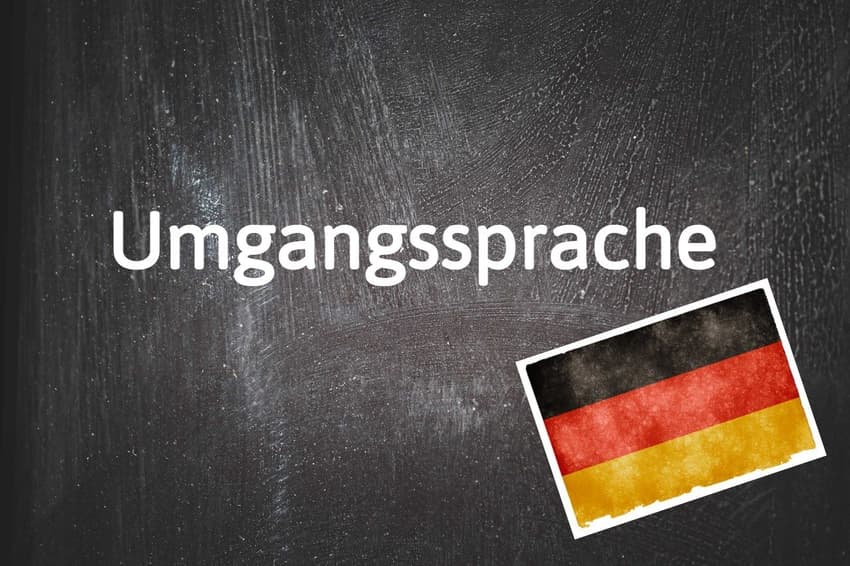German word of the day: Umgangssprache

This is a good word to be aware of when you're looking out for phrases to add to your everyday vocabulary in Germany.
Why do I need to know Umgangssprache?
We may be getting a little meta here, but we think it's worth knowing this word so you can listen out for the words around it (or know when not to use this type of language).
What does it mean?
Umgangssprache, which sounds like this, means 'colloquial language' or 'slang'. These are the kinds of words and phrases you might not find in a textbook, but they are heard in everyday life.
By using slang vocabulary, you'll be able to bring your sentences to life and sound like a true local.
The term is said to have been introduced into the German language by the writer and linguist Joachim Heinrich Campe at the beginning of the 19th century.
Umgangssprache is shaped by the world around it, whether its regional factors or social circumstances of the time.
Here are a few examples of colloquial phrases and words:
Geil means horny in German, but it is also used colloquially to describe anything you think is cool. In English, you might use the word 'sick' or 'awesome' in the same context.
Krass is another colloquial word that can mean lots of things. It is usually used to intensify the meaning of something very bad or something very good depending on the tone and context. So something disgusting is krass, and something amazing can also be krass.
Das ist mir Wurst translates to 'that's sausage to me', and means you don't give a toss.
Das ist doch Käse translates to 'that's cheese' and expresses that you mean something is absolute nonsense.
And a ruder one is: Das ist am Arsch der Welt. It means 'that's the arse of the world' and refers to a place that is far away or very difficult to reach. In English you might say 'back of beyond'.
You would hear these kinds of phrases in relaxed conversations in cafes and bars, but they aren't so common in formal situations.
Use it like this:
Ist das Umgangssprache oder kann ich das bei meinem Chef benutzen?
Is that colloquial language or can I use it with my boss?
Mir gefällt die umgangssprachliche Floskel: auf dein Nacken!
I really like the colloquial phrase 'this is on you!'
Comments
See Also
Why do I need to know Umgangssprache?
We may be getting a little meta here, but we think it's worth knowing this word so you can listen out for the words around it (or know when not to use this type of language).
What does it mean?
Umgangssprache, which sounds like this, means 'colloquial language' or 'slang'. These are the kinds of words and phrases you might not find in a textbook, but they are heard in everyday life.
By using slang vocabulary, you'll be able to bring your sentences to life and sound like a true local.
The term is said to have been introduced into the German language by the writer and linguist Joachim Heinrich Campe at the beginning of the 19th century.
Umgangssprache is shaped by the world around it, whether its regional factors or social circumstances of the time.
Here are a few examples of colloquial phrases and words:
Geil means horny in German, but it is also used colloquially to describe anything you think is cool. In English, you might use the word 'sick' or 'awesome' in the same context.
Krass is another colloquial word that can mean lots of things. It is usually used to intensify the meaning of something very bad or something very good depending on the tone and context. So something disgusting is krass, and something amazing can also be krass.
Das ist mir Wurst translates to 'that's sausage to me', and means you don't give a toss.
Das ist doch Käse translates to 'that's cheese' and expresses that you mean something is absolute nonsense.
And a ruder one is: Das ist am Arsch der Welt. It means 'that's the arse of the world' and refers to a place that is far away or very difficult to reach. In English you might say 'back of beyond'.
You would hear these kinds of phrases in relaxed conversations in cafes and bars, but they aren't so common in formal situations.
Use it like this:
Ist das Umgangssprache oder kann ich das bei meinem Chef benutzen?
Is that colloquial language or can I use it with my boss?
Mir gefällt die umgangssprachliche Floskel: auf dein Nacken!
I really like the colloquial phrase 'this is on you!'
Join the conversation in our comments section below. Share your own views and experience and if you have a question or suggestion for our journalists then email us at [email protected].
Please keep comments civil, constructive and on topic – and make sure to read our terms of use before getting involved.
Please log in here to leave a comment.